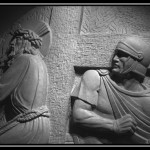We run our website the way we wished the whole internet worked: we provide high quality original content with no ads. We are funded solely by your direct support. Please consider supporting this project.

Did Jesus Instruct Us to Arm Ourselves?
Over the past few posts, I’ve been dealing with the passages that are frequently used to argue how Jesus condoned violence. One of these takes place just after the last supper and just before Jesus and his disciples were going to travel to the Mount of Olives to pray. To prepare his disciples, Jesus tells them; “if you don’t have a sword, sell your cloak and buy one” (Lk 22:36). According to some scholars, this instruction indicates that Jesus did not uniformly rule out his disciples resorting to violence in response to aggression. When read in context, I think it becomes clear that this instruction implies nothing of the sort.
First, this interpretation of Jesus’ instruction contradicts Jesus’ unqualified teachings about loving and serving enemies and about refraining from violence (e.g. Lk 6:27-36). On the assumption that Jesus would not blatantly contradict himself, we should start with the assumption that Jesus did not intend his disciples to use the swords he instructed them to buy.
Second, when the Temple Guard came to arrest Jesus, we must note how Jesus responded when his disciples asked him, “Lord, should we strike with our swords?” (Lk 22:49) – the very swords Jesus had just instructed them to purchase. Before Jesus had a chance to answer, one of his disciples “struck the servant of the high priest, cutting off his right ear” (v. 50). Jesus then said, “No more of this!” (v. 51), clearly indicating that he never intended for his disciples to rely on the swords they brought. This becomes even clearer in Matthew’s Gospel when Jesus rebukes this disciple by reminding him of the cyclical nature of violence. “Put your sword back in its place,” Jesus said, “for all who draw the sword will die by the sword” (Mt 26:52). And having rebuked this disciples’ typical worldly response to aggression, Jesus then modeled the way he would have disciples respond to aggression by healing this guard’s ear (Lk 22:51). Disciples are to serve, bless and pray for enemies, not afflict them.
The reason for Jesus’ instruction to buy swords in Luke becomes clear if we simply attend to the verse that follows it, for Jesus explains his instruction by quoting Isa 53:12: “And he was numbered with the transgressors.” Jesus then adds: “and I tell you that this must be fulfilled in me. Yes, what is written about me is reaching its fulfillment” (v. 37). It is apparent that the purpose for having some of his disciples carry swords was not so they could defend him, but simply to fulfill this prophecy, thereby justifying his opponents arrest of him as a political revolutionary. This also explains why Jesus said “[t]hat’s enough” after his disciples told him they had two swords among them prior to heading to the Mount of Olives (Lk 22:38). Had Jesus expected them to actually fight the Temple guard, a mere two swords would not have sufficed. But two were sufficient to make Jesus appear as, and ultimately to be crucified as, a political transgressor.
Finally, it is significant that when Jesus later appeared before Pilate and was asked if he was the King of the Jews, Jesus responded that his kingdom was not of this world, and he pointed to the fact that his followers were not fighting as proof of this fact (Jn. 18:36). Were Jesus the king of any earthly kingdom, his followers would have certainly taken up arms to defend him. This is how all earthly kingdoms operate. The fact that Jesus’ followers were not fighting thus constitutes the definitive proof that the kingdom Jesus ushered in was of a very different sort. And this simply confirms the point that Jesus never intended his disciples to use the swords he instructed them to purchase.
Photo credit: jonmallard via VisualHunt.com / CC BY-NC-SA
Category: General
Tags: Jesus, Kingdom Living, Non-Violence
Topics: Enemy-Loving Non-Violence
Verse: Luke 22
Related Reading

12 Reasons for Keeping the Kingdom of God Separate from Politics, Part 2
Image by the justified sinner via Flickr Satan is the “god of this age” (2 Cor 4:4) and “ruler of the world (Jn 12:30; 14:31) who “controls the entire world” (1 Jn 5;19) and possesses all the power of “all the kingdoms of the world” (Lk 4:6). While governments are ordained by God to preserve…

Sermon: The Twist
In this sermon clip, Greg Boyd discusses how when you read a book with a twist ending, the ending reframes the entire story. The Bible is no different. In this sermon, Greg shows how Jesus’ message reframes how we are to understand the Bible, and he shows us why the Anabaptists shared this belief. You…

What Does a Perfect God Look Like?
The “classical view of God” refers to the view of God that has dominated Christian theology since the earliest Church fathers. According to this theology, God is completely “immutable.” This means that God’s being and experience never changes in any respect. God is therefore pure actuality (actus purus), having no potentiality whatsoever, for potentiality is…

Sermon: The Pygmy Way
Last weekend Greg preached about the history of Woodland Hills Church as a part of the church’s 20th anniversary. It’s a pretty fun walk down memory lane as well as a challenge to follow the “pygmy way” even when it looks silly. If you’d like to download the sermon you can find it here.

The Good Samaritan, Non-Violence & Eternal Life
Renaud Camus via Compfight An expert in the law asked Jesus what he had to do “to inherit eternal life” (See the story in Luke 10:25 and following). Jesus asked him what he thought the law said about this issue. The man responded, “’Love the Lord your God with all your heart and with all…

Why NO Violence in Jesus’ Name is Justified
Image by papapico via Flickr On Friday, Greg posted a response to Obama’s speech about religiously-inspired violence. Here are some further thoughts on why violence in the name of Jesus—no matter whether we call it just, redemptive, or defending ourselves—is just another form of kingdom-of-this-world living. The love we are called to trust and emulate is supremely…
